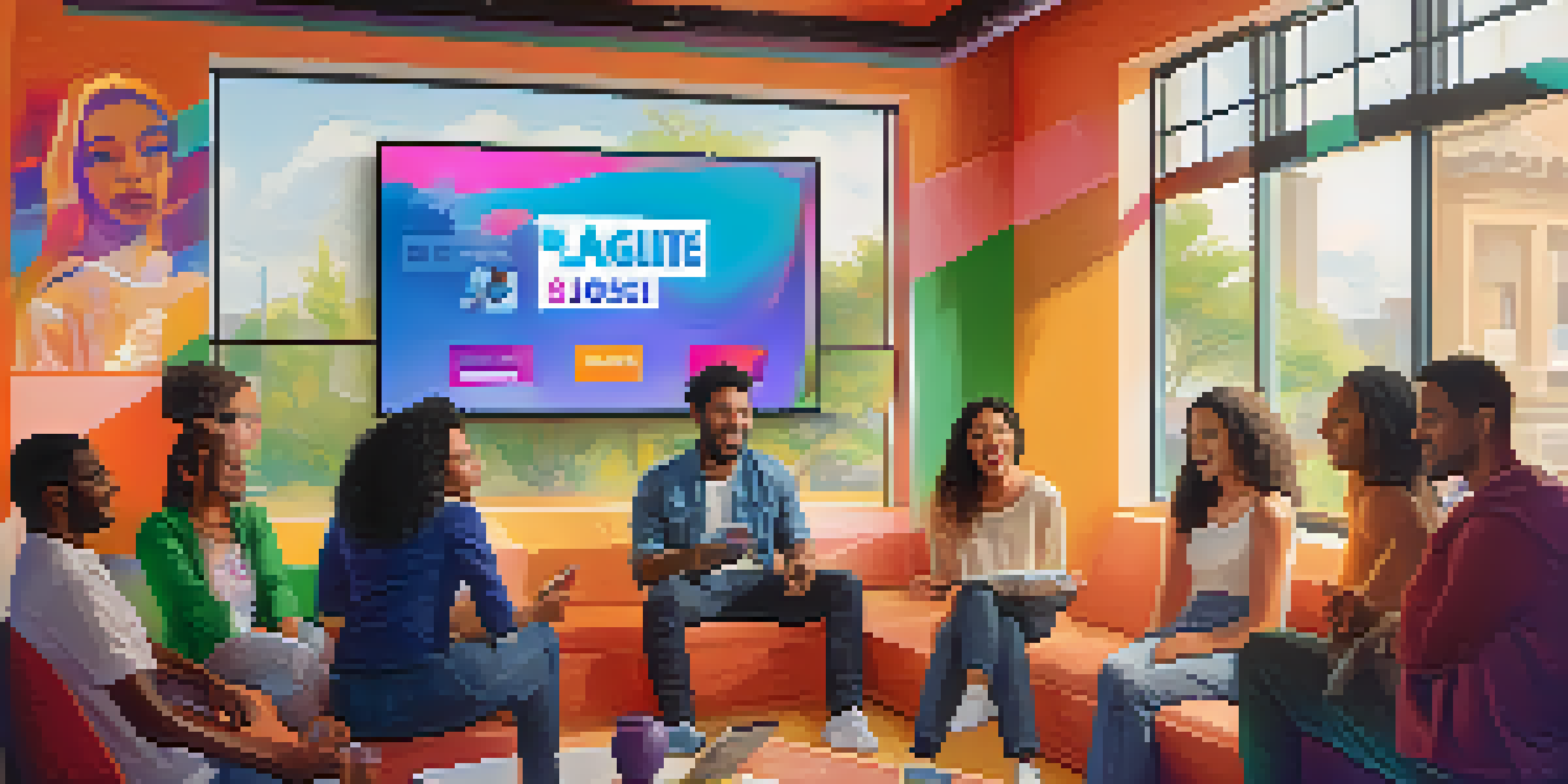Using Social Media for Civic Engagement and Awareness

Understanding Civic Engagement in the Digital Age
Civic engagement refers to the ways individuals participate in their community and democracy, including voting, volunteering, and activism. In today’s digital world, social media platforms have become powerful tools for fostering this engagement. They allow people to share ideas, mobilize support, and discuss issues that matter to them with just a few clicks.
The future of our nation is not determined by the politicians we elect, but by the engaged citizens who hold them accountable.
The rise of platforms like Twitter, Facebook, and Instagram has revolutionized how we communicate and connect. For instance, a single tweet can inspire thousands to take action on social justice issues. This shift from traditional forms of engagement to digital spaces has made it easier for diverse voices to be heard and for communities to unite around common goals.
However, it’s essential to navigate these platforms thoughtfully. While social media can amplify messages, it can also spread misinformation quickly. Understanding how to engage responsibly online is crucial for maintaining the integrity of civic discourse.
Building Awareness Through Social Media Campaigns
Social media campaigns are a dynamic way to raise awareness about important issues. Organizations and individuals alike can create visually appealing content that captures attention and spreads information. For example, the Ice Bucket Challenge effectively raised awareness for ALS through engaging videos and social sharing.

When crafting a campaign, it’s important to identify your target audience and tailor your message accordingly. Using hashtags and collaborating with influencers can significantly increase your reach, helping your message resonate with more people. The right combination of creativity and strategy can turn a simple idea into a viral movement.
Digital Tools Boost Civic Engagement
Social media platforms empower individuals to participate in democracy by sharing ideas, mobilizing support, and discussing important issues.
Moreover, success isn’t solely measured by likes or shares; it’s about fostering meaningful conversations around the topic. Encouraging discussions in the comments or hosting live Q&A sessions can deepen understanding and drive more significant engagement.
Creating a Community of Advocates Online
Social media platforms provide an opportunity to build a community of advocates who share a passion for similar causes. By joining groups or participating in discussions, individuals can connect with others who have shared interests, experiences, and goals. This sense of belonging can empower people to take action collectively.
In a world where you can be anything, be kind. Kindness is the key to civic engagement and social change.
For instance, Facebook groups dedicated to environmental activism allow members to share tips, organize events, and support one another’s efforts. These online communities can serve as a springboard for real-world action, turning digital conversations into tangible results.
However, fostering a supportive environment requires active moderation and encouragement from leaders within the group. By promoting respectful dialogue and inclusivity, communities can thrive and make a meaningful impact.
Mobilizing for Change with Hashtags
Hashtags have become a rallying point for social movements, allowing users to categorize content and join larger conversations. Campaigns like #BlackLivesMatter and #MeToo exemplify how a simple phrase can unite voices across the globe, making issues more visible and pressing. These hashtags not only amplify personal stories but also serve as a call to action.
When people see a hashtag trending, it can inspire them to get involved, whether that means attending protests, contacting their representatives, or sharing information. Hashtags create a sense of urgency and community, making individuals feel like they are part of something bigger than themselves.
Hashtags Unite Movements Globally
Hashtags like #BlackLivesMatter and #MeToo help categorize content and create a sense of community, driving awareness and action around social issues.
To effectively use hashtags, it’s crucial to research and choose ones that resonate with your message and audience. Engaging with trending topics can also help your content gain traction and reach a wider audience.
The Role of Influencers in Civic Engagement
Influencers hold a unique position in the landscape of social media and civic engagement. With their established followings, they can significantly amplify messages and mobilize their audience around various causes. Collaborating with influencers who align with your mission can provide an authentic voice that resonates with their followers.
For instance, celebrities advocating for climate action can reach millions, inspiring fans to participate in environmental initiatives. When influencers share personal stories related to civic issues, it humanizes the cause and encourages others to engage as well.
However, it’s essential to choose influencers who genuinely care about the cause. Authenticity resonates with audiences, and partnerships should reflect shared values for maximum impact.
Engaging Youth Through Social Media Platforms
Engaging younger audiences is crucial for fostering a future of active citizens. Social media is where many young people spend their time, making it an ideal space to promote civic engagement. Platforms like TikTok and Snapchat, known for their creative and informal content, can be harnessed to convey important messages in engaging ways.
For example, short videos can quickly inform viewers about upcoming elections or local initiatives. By using humor, storytelling, or challenges, organizations can capture the attention of younger audiences and motivate them to participate in civic activities.
Challenges of Misinformation Online
The rapid spread of misinformation and online toxicity can hinder civic participation, making it essential for users to verify facts and foster respectful dialogue.
Moreover, integrating educational content about civic responsibility and rights can empower young people. Providing them with the tools to understand their roles in democracy can create a generation of informed and active citizens.
Challenges of Civic Engagement on Social Media
While social media offers exciting opportunities for civic engagement, it also presents challenges. Misinformation can spread rapidly, leading to confusion and eroding trust in institutions. Users must be vigilant about verifying facts and sourcing credible information before sharing it.
Additionally, online harassment and toxicity can deter individuals from participating in discussions about civic issues. Creating a safe and respectful environment is essential for fostering healthy dialogue and encouraging diverse perspectives.

Finally, the pressure to maintain a perfect online image can discourage people from engaging authentically. Encouraging a culture of openness and vulnerability can help individuals feel more comfortable sharing their thoughts and experiences.
The Future of Civic Engagement in a Digital World
As technology continues to evolve, so too will the landscape of civic engagement. The rise of new platforms and tools will likely create even more opportunities for collaboration and activism. Staying informed about emerging trends and adapting strategies will be essential for anyone looking to make a difference.
Moreover, as digital literacy improves, we can expect more individuals to engage critically with information and participate in civic activities. This shift will empower communities to harness social media for positive change effectively.
Ultimately, the future of civic engagement will depend on our ability to leverage the strengths of social media while addressing its challenges. By fostering a culture of informed participation, we can create a more engaged and active society.